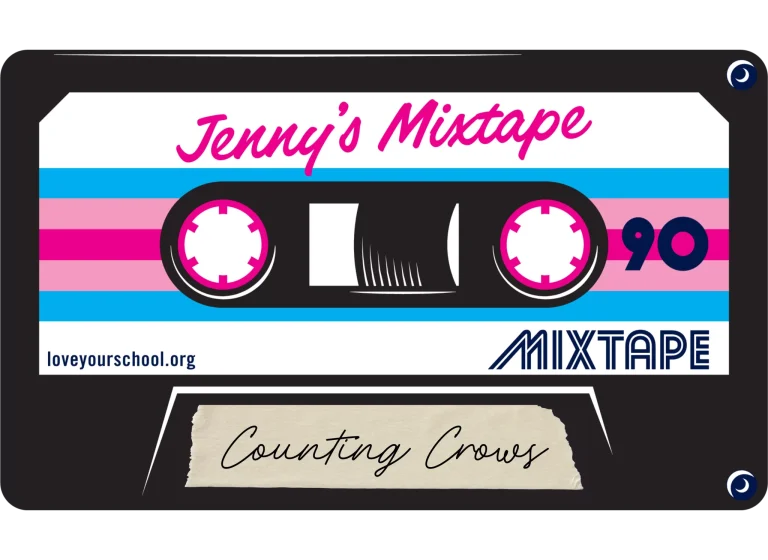One of the coolest things I did in college (well, my kids don’t think so) was being a part of a student group that put on a sold-out concert at the University of Arizona with Counting Crows in 2001. I know – so random, right? The tickets were like $11 – and as a result, students decided to camp outside Centennial Hall the night before to ensure they got one of these smoking deals. I was only 19 and I was so worried about something happening at the ticket-campout so I camped out too, somehow hoping nothing crazy would happen on my watch. I slept on a concrete bench and got like three hours of sleep. The concert sold out and Counting Crows was just as incredible as we could have hoped. They played like 18 songs and even came outside after to sign memorabilia for fans.
Here are some photos I found from the AZ Daily Wildcat in 2001 by Kevin Klaus:


Looking back on that event, with my now much older memory (yes, this was 20 years ago) all I remember is that it was CRAZY! I didn’t know the first thing about planning a concert then. I remember flipping through a magazine of some sort that was used for booking musicians. I kid you not, it had their name, estimated costs, and the names of their agents or booking company. And you just called them. If they were interested, you could sign a contract and they’d come. Ah, the good ol’ days!
“Don’t it always seem to go
That you don’t know what you’ve got till it’s gone
They paved paradise
And put up a parking lot”
Big Yellow Taxi – Counting Crows version
ESA Debit cards: gone?
If you’ve heard anything out of Arizona since the Universal ESA program passed in the past several months, you’ve likely heard something here and there about debit cards that some families have, and some do not. Let’s clarify the issue, and talk about why it’s an issue in the first place. My goal with this Mixtape is to help policy makers and state leaders realize they may not know what a good thing they’ve got in debit cards . . . until they’re gone.
Bank of America cards to a Marketplace
When our older kids initially qualified for an ESA in 2018-2019, we were issued a Bank of America debit card to utilize our Empowerment Scholarship Account (ESA). The process was straightforward: we would upload receipts and credentials for each transaction. You had to make sure that all your expenses were accounted for, in order to receive the next quarter’s funding.
About a year later, the program transitioned to using a third-party vendor so that we could have an online marketplace to make purchases through. Families were told we wouldn’t lose our debit cards, but that quickly changed. The online marketplace was difficult, most of our vendors weren’t in it, and all of a sudden a lot of families saw our services for our kids come to a screeching halt during the transition. Thanks to some incredible ESA parent advocates who challenged the Arizona Department of Education (ADE) – (run by Kathy Hoffman at the time), debit cards were given to ALL ESA families who wanted them.
It’s important to note that not all families wanted or needed a card. That’s because their child may have been attending an online or in-person private school and they were happy with the “pay vendor” option that was provided. Arizona families on an ESA prior to February 2023 had four ways to make purchases once debit cards were reinstated in 2021:
- Online marketplace (shop inside the platform)
- Pay vendor (selecting the company inside the system and uploading the invoice)
- Reimbursement (spend your own money, get paid back)
- Debit card (pay with the card, upload the receipt or invoice in your child’s account)
Why is a Debit Card Needed?
First and foremost, the flexibility debit cards provide empowers families who need it the most to access the educational resources their children need. I also strongly urge free-market folks and education policy leaders to support the use of debit cards and continue to appreciate the beauty of ESAs in “unbundling” a child’s education. Debit cards can play a key role in this unbundling.
Those who oppose the use of debit cards– both inside and outside the school choice movement– often express an unwarranted concern over misuse and ignore both the benefits they provide and the safeguards in place to prevent misuse. It’s important for policy makers to remember the following:
- The families who benefit the most from debit cards are those who are low-income or have a child with a qualifying disability or who live in rural communities. To state it another way, the lack of a debit card option disproportionately impacts low-income or special needs or rural children.
- Much of the apprehension toward debit cards, even from national school choice groups and education policy folks, seems to be based on a misunderstanding of how the cards would work in an ESA program and a lack of understanding of the benefits they provide. (I don’t care much what anti-school choice groups say. You could buy the exact same textbook with an ESA that is used in a district classroom and they’d still cry foul).
- In Arizona, where debit cards have been used for several years, the incidence of misused funds is less than 1%. I wonder how this compares to other government programs?
What Happened In Arizona?
The debit card fiasco in Arizona has been so confusing and frustrating for ESA families, especially for those who were issued a debit card for one child, but couldn’t get one for the other. Families have been allowed to request a debit card since it became “optional” in 2021. This continued even after the Universal ESA law went into effect in late September 2022. Then, in early February 2023, current ESA families were told via a weekly update from ADE that no more ESA cards would be issued. This created an unfair situation with “have” and “have nots” within the ESA program.
ESA parents heard two conflicting justifications for why no new debit cards would be issued:
- One explanation was that the change in policy was to address misuse of scholarship funds. However, those who already had a card could keep it.
- Another explanation was that there were no actual issues with misspending, but that managing debit cards for so many students was untenable for ADE staff. The program could simply not be scaled if debit cards were issued to new participants.
Obviously, this left parents, vendors, private schools, pretty much everyone, extremely frustrated and even more confused! Which was true, and why are we removing this option, when the majority of ESA families are not asking for a debit card?
Concerned parents spoke up at meetings, provided feedback (when there was still a decent online form to give feedback), sent emails, asked for data, for clarification, for some honesty around the issue. They still haven’t gotten it.
So, Where Are We Now?
We are at the same place we were in February 2023. Some parents have cards, like me (phew, most of my vendors require that I pay with the card and not through the online system) and a growing majority of parents, those who applied after February, do not. Do ESA families know if debit cards are going away entirely? Nope. Do we know if all families will finally get this option as they should? No again.
I get asked weekly from parents, “Where are we at now on the debit card thing?” Their guess is as good as mine – no one knows because no one has communicated with parents.
Considerations:
- When crafting ESA programs, policy makers should consider that families unbundling their child’s education will need more than just an online marketplace to make purchases.
- Not all families will need a card to access their scholarship funds, but those that do are likely unable to do reimbursement or live in areas where getting their vendor on a platform is exceptionally difficult.
- Tracking misspending and fraud, just like in any government program, is essential and should be a top priority. However, when analyzing and reporting the misuse of ESA funds it should be done in comparison with misspending in public schools and other government programs like Medicare and SNAP.
- Do we trust parents? Is that really true? Or are we going to live in fear of supposed misspending and regulate ESAs to the point where no families want to use them. States need to decide where they stand.
Arizona’s weekly ESA update includes a chart showing orders to be processed: (this one is from June 30, 2023)

What type of payment method do parents appear to use the most? Well, according to the chart – the answer is pretty clear. It’s the debit card option. Shouldn’t we support a broad range of free-market solutions, including debit cards, when it comes to ESA programs?
Warmly,








